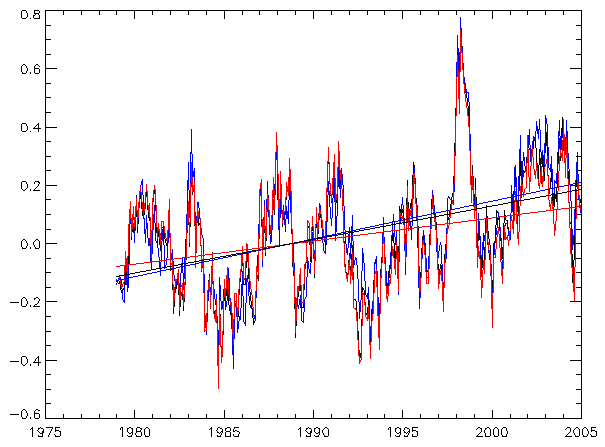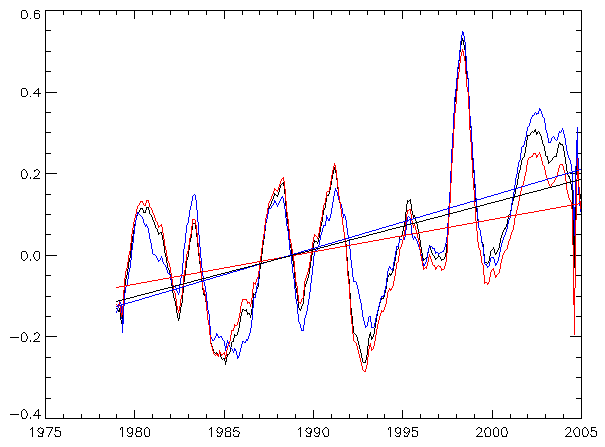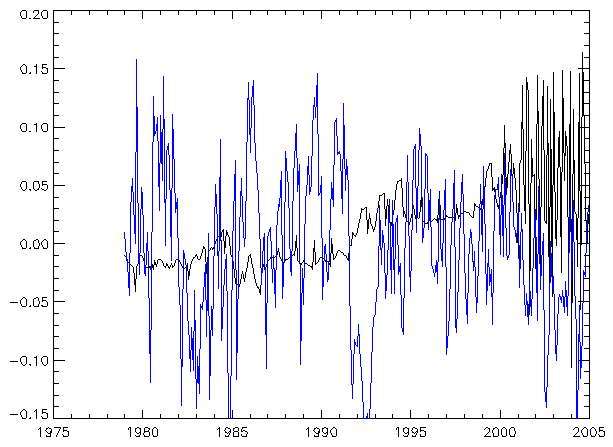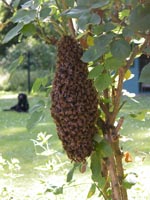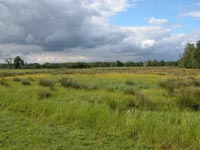I think that the climate (specifically the Holocene climate, ie since the end of the last ice age) is stable: ie, there are no chaotic swings or wild jumps. You can't say the same for the last glacial period, because there *are* large swings called
Dansgaard-Oeschger events and perhaps more. Those jumps are (probably) linked to the Laurentide ice sheet, so its just possible to finangle it by making the ice sheet an external forcing, but that could be considered cheating. Anyway, I'm talking about now, not then.
Of course, this isn't a very novel view: if the climate wasn't stable and responding fairly smoothly to imposed perturbations, then you couldn't attempt to predict it. So the-climate-is-stable is the view, probably without ever having considered it terribly carefully, of most climate scientists.
But, of course, you get skeptics saying: if you can't predict the weather a week in advance... (all together now)...
How can we predict the climate 100 years in advance?. There are lots of answers to this: the most obvious are in the previous post: another one is: weather and climate are different. Thats why they have different names.
So: what is climate? A question not often bothered with. The answer is, something like, the statistics of weather. So this includes the 30-year running mean that is the older "definition" of climate; as well as the year-to-year variability. For example, if you look at the
temperature record then you see that the interannual variability has remained about constant over the past 120 years of the instrumental record. The same page shows that the average (global/hemispheric) temperature has (excluding the most recent GHG forced episode) stayed within +/- 0.5 oC of a mean value over the past 2000 years. Thats really quite stable.
So what transforms a chaotic system (weather) into a stable system (climate)? Averaging, of course. Predicting the temperature on any given day of next summer is impossible: predicting an average summer temperature is easier; predicting a 10-year mean is easier still. There will probably be, next summer in the UK, one day that is colder than the warmest day of next winter (which is itself a stable climate statistic, of course its one that I've made up off the top of my head but its quite likely true...). However, next summer will certainly be warmer than next winter. Note that the famous "
year without a summer" wasn't a chaotic fluctuation: it was a response to an external perturbation, viz the volcano Tambora.
Its possible to produce a simple model of this, the Lorenz equations/attractor: the famous butterfly shape. For the rest of this para I'm relying purely on memory, so please correct me, but: the Lorenz equations lead to chaotic trajectories, ie initially close trajectories diverge. But: the overall PDF (probability density function) of particle-location is perfectly stable (and bimodal) if you average. You can modify the equations to include a forcing term: this results in shifting the PDF so the particle sits in one of the wings more often than the other, but is nonetheless a smooth response to the forcing. This is all Tim Palmers stuff, and he wrote it up nicely in weather some time (his point was, that climate change could be more about different residence times in various modes than shifts in the modes themselves). If anyone (JA?) can point me to a decent set of refs for this bit, I'd be grateful...
What about large scale shifts like the ice age cycle? These appear to be regular, and linked to orbital forcing, so count as responses to external forcing (albeit with internal feedbacks amplifying it). Even some of the variability of the last 2kyr comes into the forced category, though its not clear yet quite how much: bits of the so-called MWP/LIA may be.
Of course people *do* worry about is the possibility of chaotic shifts: the shutdown of the THC could come into this class. Methane clathrates could, too. But at the moment, AOGCMs don't produce chaotic THC shifts that simpler models do. This could be a flaw in the GCMs. Or they may be right.
